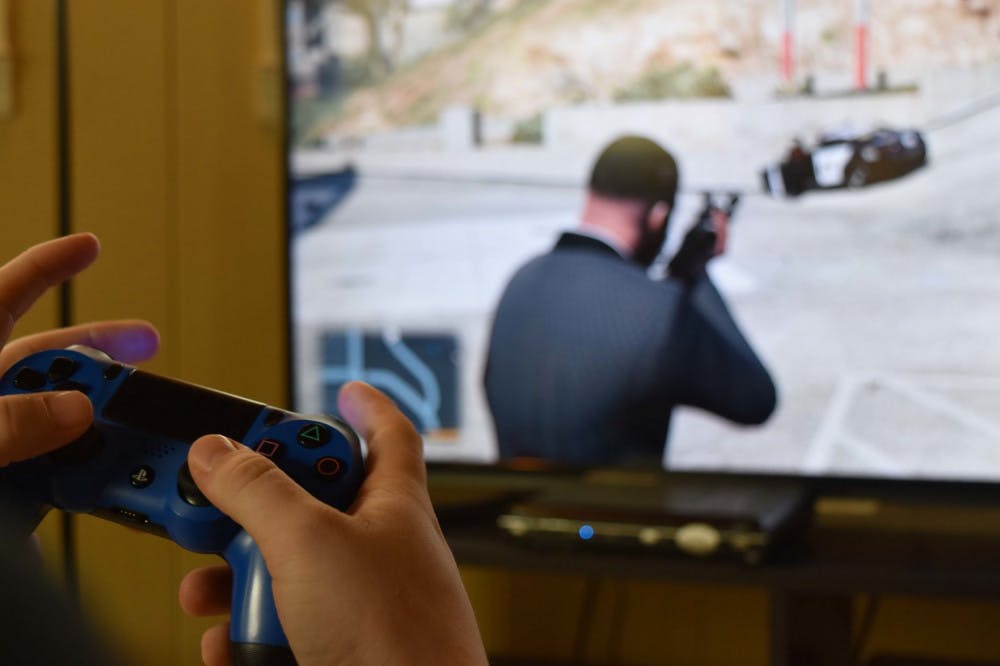When there is a mass shooting at a school in the United States, society’s conversations vary from gun control to mental health.
Recently, President Donald Trump claimed movies are “so violent,” and young children are exposed to violence online.
“We have to look at the Internet because a lot of bad things are happening to young kids and young minds, and their minds are being formed,” Trump said. “And we have to do something about maybe what they’re seeing and how they’re seeing it and also video games. I’m hearing more and more people say the level of violence on video games is really shaping young people’s thoughts.”
Trump’s remarks brought the discussion of video games and violence to the forefront.
The U.S. Supreme Court struck down a California bill in 2011 that attempted to ban the sale of violent video games to children. It defined violent video games as ones “in which the range of options available to a player includes killing, maiming, dismembering or sexually assaulting an image of a human being” and that did not have “serious literary, artistic, political or scientific value.”
David S. Heineman, communications professor at the Bloomsburg University of Pennsylvania who studies video game communication, said there is no truth to Trump’s assertions.
“It is not accurate, but it is a claim that is often repeated after shootings because for some people video games, or violent films, or violent lyrics, etc., make an easy scapegoat because, well, both involve violence,” Heineman said.
Heineman said almost everyone plays video games, and that includes violent ones, and he also said no studies have shown a correlation between violent acts like what was seen in the recent school shooting in Florida to people playing video games.
Though video games are not the root to cause people to act violently, Heineman said there are some external and internal forces that can cause a person to become violent, such as childhood development, or lack thereof.
“Whether or not someone might be likely to commit violence is not always predictable, but I understand that there are at least a few common warning signs that, especially in combination, almost rise to the level of being predictors,” Heineman said.
Heineman said there are other factors to consider as well. He said people who feel isolated, alienated or discriminated against can all become violent. Nevertheless, Heineman said these particular forms of media, like all media, definitely have impacts on society.
“I do think that violent media can be used to support an existing ideology or disposition that is itself already conditioned towards violence,” Heineman said. “Ideally, though, people would learn to become critical consumers of their media and able to separate fantasy from reality.”
Heineman said media education should be a part of schools’ curricula from elementary school through college.
“I am often dismayed when people come to college and have clearly never considered how the media might have shaped their worldview, why they enjoy what they enjoy,” Heineman said. “We need to teach more critical thinking about media, and everything else, in fact, and not try to regulate and scapegoat media that we arbitrarily decide is ‘violent.’”
Ammi Vinson, a mental health counselor, said Trump’s statements are “inaccurate,” and lack of education is one of the roots of these violent acts.
“I believe not educating people on how to deal with negative emotions, not disciplining children on how to handle disappointment, hurt, rejection or not cultivating self-esteem and self-confidence are all influences within society that have the potential to trigger violent behavior,” Vinson said.
Vinson also said society does the mentally ill community a disservice when people automatically claim school shooters are mentally ill.
“Let me make sure to state as a mental health professional, there is so much stigma on people with mental illnesses, and the assumption that all people diagnosed with some form of mood or psychotic disorder automatically are violent or will commit violent acts,” Vinson said. “That is absolutely false. Every person diagnosed with some type of mental illness does not commit criminal and/or violent acts or pose a harm to others. Everyone has the potential for violence if they succumb to the urge of acting out in that manner.”
A student plays first-person shooter video game Grand Theft Auto 5 at his home near campus. President Donald Trump said last week that violent video games and movies contribute to real-life violence like school shootings.






